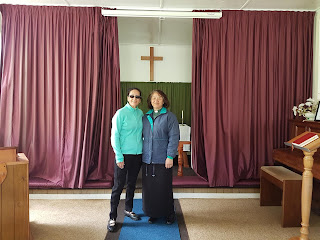As I drove towards the sandhills on the horizon I was very conscious that this trip would be very different than previous visits to the Hokianga. This was not just about the connection one makes with the environment, landscape and known Whanau but an acute awareness that I was endeavouring to dig deeper into the social and historical context of the Hokianga. I sensed new learnings and friendships would be an offshoot to the growing excitement - arising within.
In particular, I was much more aware of the small community of Whirinaki. A community one drives through on State Highway 12 to get to Pakanae where my father spent his formative years with mother Keita and father Tere. The women I am writing about came from this community. Because of my research, I had gained a heightened awareness of the history and social fabric of Whirinaki and my desire was to build upon that understanding.
 |
| Reflecting... about those women who had come before |
When I pulled up at the Urupa (cemetery) in Pakanae I parked next to a couple of other vehicles. As I stood in front of Keita and Tere’s headstones I was deep in thought but aware of another couple a few rows in front. The view beyond the Urupa is the Hokianga Harbour and across the Harbour, it's glorious sandhills - well known.
The couple in front made a move towards the exit gate and as he passed he raised his eyes to say Kia Ora and noted the headstones I was present at. I mentioned that they were my father’s parents and he commented that my wife Alexa is part of your Whanau. Before I realised we were both in an embrace and trying to work out how in ‘a moment in time', that this connection was made? Eliza was visiting her parents’ graves and heading back to Auckland. My journey to the Hokianga commenced three days earlier. Yes, in that embrace I did feel overwhelmed. Nonetheless, a new Whanau connection and communication was the outcome!
On the following day, I attended the Anglican Service in Whirinaki and part of this service included singing hymns in Maori. I did not find this difficult because during my primary school years it was not uncommon to sing Maori songs. However, back then one was not expected to understand the meaning of the words. Nor was it included in the educational curriculum. So I discovered that all I needed to do was listen at the commencement of the hymn to pick up the pace and sounds and away I'd go. This was a surprise I must say.
 |
| Viti and Minister Marina (NAERA) inside St David's church in Whirinaki |
Such experiences continued and reflected in the analogy of a snowball throughout the week. After Sunday's Service, I met up with Phoebe Watkins who had laid the foundations for my visit and her value cannot be underestimated. As was the contribution of so many, their storytelling and willingness. It warmed my spirit and soul.
The importance of land and water will make up Vinyette 2.
Warm regards
Viti x








